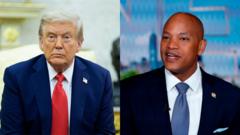In an unexpected turn of events, a ban on wigs, hair extensions, and skin-lightening products at the Grand Théâtre de Dakar in Senegal was swiftly annulled after provoking strong public outcry. The internal memorandum, issued by theatre director Serigne Fall Guèye and sanctioned by the national culture ministry, aimed at promoting Pan-African values and preserving cultural integrity, yet it incited allegations of gender policing and oppression.
Critics, including feminist groups and civil society leaders, interpreted the ban as a reflection of enduring gender inequalities in Senegal, especially given the underrepresentation of women in President Bassirou Diomaye Faye's administration. With only four women in the cabinet of 25, the ban's implications were seen as particularly regressive. Social media erupted with criticism labeling the ban as invasive and paternalistic, drawing particular ire due to Guèye's political connections with the anti-colonial ruling party, Pastef.
Fatoumata Ba, a political analyst, articulated that the discussion transcended the superficial issue of wigs, framing it instead as a contest over identity and cultural imposition. Many commentators, including feminist intellectual Henriette Niang Kandé, expressed disbelief regarding the rationale behind the ban, emphasizing that choices about hair are often practical, aesthetic, or economical rather than rooted in cultural deficiency.
While Guèye defended the directive as an effort to reclaim African dignity within the arts, opponents countered that true cultural identity is not merely about appearance but is intertwined with deeper, systemic challenges facing the nation. Sociologist Mame Diarra Thiam urged that affirmative action for African identity should focus on profound societal issues like education and economic justice rather than regulating personal appearance.
As public pressure mounted, Guèye retracted the ban, citing misunderstandings about its intent and restating his commitment to the theatre's cultural mission. Nonetheless, the incident has unveiled significant discontent among the urban youth and progressive civil society, who feel increasingly disillusioned with the conservatism and consolidation of power by the government led by Pastef.
Ultimately, the brief wig ban at the Grand Théâtre serves as a microcosm of larger discussions concerning cultural authenticity, gender rights, and individual freedoms in Senegal, while the debate ignited by the policy continues to resonate throughout society.




















